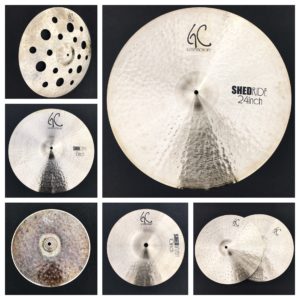Guidelines for Church Drummers
Drums are an essential part of the modern Christian Church. Drums do more than simply keep time. Drums add depth and heft to the “hand clapping and foot stomping” of the traditional church service.
Just as many other venues have rules of decorum, so does the church sanctuary and church drummers would be wise to learn the rules and abide by them with discipline. The following guidelines provide a few essential tips that will help any church drummer find success in a modern church setting.

The Church Service is Not the Practice Room
During the church service, the drummer should operate like a well-oiled machine, having all songs memorized, timing on lock, and any chop opportunities pre-calculated. Because of the spiritual sensitivity of the worship environment, it is a terrible idea to try out new, unrehearsed ideas during the church service.
Simply put, DO NOT practice your new ideas during the church service, because if you fail to execute properly, you can create a distraction that interrupts someone’s communication with God.
Your execution during the church service should be flawless and there’s only one way to make it so; practice beforehand.
Learn to Play With a Click Track
Many effective church bands use a click track of some sort. From slow worship songs and gospel hymns to high-tempo praise breaks, click tracks have become commonplace in modern church bands. Some use the Akai MPC, while others use dedicated computer software. Regardless of the click source, church drummers must rehearse with a click track in order to become comfortable playing along with it. Let’s be honest, a click can be a distraction to your musicality at first, but with time and practice, drummers can learn to adapt and pull musicality from the click. Take the time to get comfortable with the sound and internalize the pulse for your benefit and the benefit of the band. Remember, the click is your friend.
Stay Tuned
Have you ever seen a church drummer tuning his or her drums during service? Even worse, you may have seen a worship team actually waiting for the drummer to get tuned and ready before starting a song. Beyond the obvious embarrassment this causes, it presents an unprofessional image and causes a distraction to the overall worship experience.
If you know the song list before service, you should tune your drum kit accordingly before service. Sometimes this requires arriving at the church early to give yourself more prep time. However, church drummers are not only expected to be professionals, but they are also expected to be competent assistants to worship leaders. Accordingly, church drummers should minimize their distractions, becoming so natural to the flow of the worship experience that we hardly notice them.
If your drums are out of tune, you create an awkward musical experience. In your woodshed – while rehearsing songs for Sunday service – pay attention to the tuning of the original song and try to recreate the sound that worshippers are accustomed to hearing in the song. Due to the variety of your song list, you may not be able to tune your drums perfectly for an individual song, but if you remain aware of the music, you can probably choose to play some drums and not play others to create a close reproduction of the sound.
Enhance! Enhance! Enhance!
Learning to flow with the spirit in a church service is likely the most difficult task for a church drummer. The best way to learn this unique task is to actually become a spiritual drummer. This means that you are not simply assisting others in worship, but you become so involved in the worship experience that you are worshipping through your playing. In doing so, you are not just a musical tool for worship, you are a worshipper.
When you gain this level of understanding and connection to the church environment, you should naturally notice that your musical intent matures. You will no longer seek to play chops for the sake of chops because it would distract your own praise. At this point, you will be compelled to play chops where they are appropriate to the musical and spiritual setting.
It’s Not What You Play, It’s How You Play It
One of the most unique characteristics of playing the drums in the church is the potential for the spiritual energy to shift at any moment, which requires extraordinary attention to detail in order to “flow with the spirit.”
When you hear church drummers discuss their ability to flow, they’re mainly talking about their adaptability to fluid situations during worship service. Keep in mind that the necessity of flow varies from church to church. While some churches adhere to a strict program, others allow the freedom to alter songs and programs as they see fit. An attentive and experienced church drummer can anticipate these shifts and adjust his or her drumming accordingly.
For example, in a more free church environment, the service may go from quiet worship to high praise in an instant and without much warning. In these circumstances, experience reigns supreme and most drummers learn how to shift appropriately by watching other drummers who have more experience. Although a 6-stroke roll might be usable in either situation, you would likely want to play it very differently for each. Remember, skill is knowing what to play, but wisdom is knowing how to play it differently in different situations.
Worship Drumming is a Specialty
Drumming in the church is a special skill that takes time to master. It involves many variables that are foreign to other genres and venues. It also involves the extra responsibility that comes along with knowing that if you get it wrong, you could distract someone from their spiritual connection with God. Accepting that responsibility makes church drummers special. They are more than just drummers. They are musical ministers.




Hello my name is Ernest. I am a drummer
This is truly good advice.